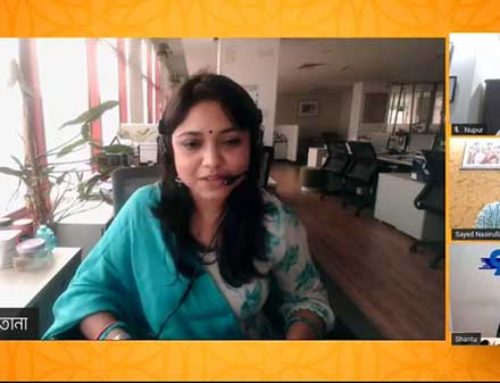Introduction of the organization:
Educo is a global development and humanitarian action NGO with over 25 years’ experience working in 13 countries to defend children and their rights, especially the right to an equitable and quality education. We are carrying out projects which include participation from more than 400,000 children and more than 200,000 adults. We work with children and their communities to promote just and equitable societies which guarantee their rights and wellbeing. Since 1999, we have been implementing education and development projects in the marginalized urban areas of Dhaka, Narayanganj (Rupganj) district and in the rural areas of Gazipur (Kaliganj) and Mymensingh (Bhaluka). We have recently expanded our work in the northeastern part of Bangladesh in Tea Garden and Haor areas (Sreemangal and Kamalgonj) in Moulavibazar District. Our work in Cox’s Bazar focuses on dealing with the Child Protection issues – especially with the Rohingya and Host communities.
Programmatic interventions in response to COVID-19
Since the beginning of the COVID-19 crisis, Educo Bangladesh has been supporting the disadvantaged people in its working and non-working areas. Educo Bangladesh has supported the disadvantage people in 2 phases. 1st phase 01 May-31 July and 2nd phase 1st June-31 August 2020. In the first phase Educo has stood beside the children and their families in slums located in Dhaka and Narayanganj districts, brothels in Rajbari and Faridpur districts and indigenous (plain-land Adivasi) communities in Rajshahi and Chapai Nawabganj districts with food, cash, and health and hygiene kits.
In 1st phase 5,564 vulnerable families got 1,000 taka each, including families of children studying in Educo schools living in Dhaka’s slums and Narayangonj districts; and children and families supported by the organization’s anti-child labor project ODHIKAR (Options for Dignity of Human Being by Influencing Key Actors to Reform). In Rajshahi and Chapai Nawabgonj districts, Educo distributed life-saving food packs containing 10 kg rice, 2kg dal (pulses), 1 litre oil, 3 kg potatoes, and 1kg salt to 1,059 plain land Adibashi families, many of whom are vulnerable and marginalized.

1st phase distribution to disadvantage people
To support the underprivileged children living in different brothels of Rajbari and Faridpur, Educo provided 1,501 food and hygiene kit packages (Rice 5 kg, Dal 2kg, oil 1litre, Potato 3 kg, Salt 1 kg, Detergent 01 KG, 01 Soap, 01 mask) and 415 child-food support packages containing 1kg sugar, 500g semolina, 250g milk and biscuits.
In the 2nd phase, Educo Bangladesh distributed food to 1,000 marginalized indigenous families in Rajshahi and Chapai Nawabganj districts and 1,270 deprived people living in brothels in Rajbari and Faridpur districts received both food and hygiene support with additional 280 child- food packages. Educo Bangladesh also gave humanitarian support to 9,269 families of Moulvibazar’s Haor and Tea gardens.

2nd phase distribution to disadvantage people
Inadequate food and lack of hygiene have always been a concern for the vulnerable communities in Haors of Bangladesh. During the COVID-19 pandemic, children and their families in these areas are facing unexpected hardships, difficulties in access to markets, and shortage of agricultural supplies, impacting not only their source of income but also proper nutrition. Current pandemic has increased hygiene concerns in tea garden as well. Educo has distributed food packages (rice, lentil, fortified vegetable oil, potato, salt, sugar/brown sugar molasses) and hygiene kits (bathing soap, detergent powder, bucket with lid and tap for hand washing, 02 masks) to 313 families in Haor and hygiene packages to 8,956 families living in Tea gardens in Moulvibazar.
2,290 families from 10 wards of Dhaka North and South City corporation have received BDT 1,000 via bKash to help with their daily needs.
Educo Bangladesh distributed leaflets on coronavirus awareness to most of the beneficiaries it had supported. The messages covered the do’s and don’ts during coronavirus pandemic for reducing the risk of infection. The leaflet also highlighted some child protection issues in this pandemic situation. It is expected that the leaflet will create awareness among the beneficiaries helping them take preventive measures against the virus. Moreover, awareness messages are shared in the distribution points.
Challenges:
- Identifying limited no. of families from thousands of households suffering from food insecurity was very difficult following the measurement indicators of beneficiary selection, satisfying all the community people and avoiding the interference of groups with vested interests.
- Lack of social consciousness among the beneficiaries for maintaining social distancing.
- Coordinating the availability and opening of mobile money accounts of beneficiaries through phone calls.
- Orienting the partner organizations and relief workers through virtual communication.
- Orienting the partners on child safeguarding and protection virtually
Outlook and recommendations:
Lesson learnt:
- Mobile money transfer can be very effective support strategy during this kind of pandemic situation for avoiding public gathering and ensuring social distancing.
- Regular follow-up and guidance are crucial for ensuring the safety and security of staffs and beneficiaries and maintaining social distancing in distribution points.
Recommendations:
- Many development organizations have come forward to support the community people in many areas who have come marginalized in COVID situation. There should have a coordination between the organizations so that they can extend best support to the survivors considering their real challenges and avoiding duplications.
- Sector specific policies are needed to develop for combating COVID affects in the coming days. Bangladesh going to be the best sufferer if the situation prolongs for long. Therefore comprehensive advocacy strategies needs to be developed keeping the local, national, International organizations and development partners aligned.





